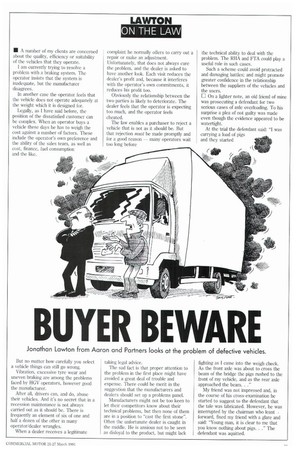BUYER BEWARE
Page 33

If you've noticed an error in this article please click here to report it so we can fix it.
Jonathan Lawton from Aaron and Partners looks at the problem of defective vehicles.
• A number of my clients are concerned about the quality, efficiency or suitability of the vehicles that they operate.
I am currently trying to resolve a problem with a braking system. The operator insists that the system is inadequate, but the manufacturer disagrees.
In another case the operator feels that the vehicle does not operate adequately at the weight which it is designed for.
Legally, as I have said before, the position of the dissatisfied customer can be complex. When an operator buys a vehicle these days he has to weigh the cost against a number of factors. These include the operator's own preference and the ability of the sales team, as well as cost, finance, fuel consumption and the like, But no matter how carefully you select a vehicle things can still go wrong.
Vibration, excessive tyre wear and uneven braking are among the problems faced by HGV operators, however good the manufacturer.
After all, drivers can, and do, abuse their vehicles. And it's no secret that in a recession maintenance is not always carried out as it should be. There is frequently an element of six of one and half a dozen of the other in many operator/dealer wrangles.
When a dealer receives a legitimate complaint he normally offers to carry out a repair or make an adjustment. Unfortunately, that does not always cure the problem, and the dealer is asked to have another look. Each visit reduces the dealer's profit and, because it interferes with the operator's own commitments, it reduces his profit Lou.
Obviously the relationship between the two parties is likely to deteriorate. The dealer feels that the operator is expecting too much, and the operator feels cheated.
The law enables a purchaser to reject a vehicle that is not as it should be. But that rejection must be made promptly and for a good reason -many operators wait too long before
taking legal advice.
The sad fact is that proper attention to the problem in the first place might have avoided a great deal of trouble and expense. There could be merit in the suggestion that the manufacturers and dealers should set up a problems panel.
Manufacturers might not be too keen to let their competitors know about their technical problems, but then none of them are in a position to "cast the first stone". Often the unfortunate dealer is caught in the middle. He is anxious not to be seen as disloyal to the product, but might lack the technical ability to deal with the problem. The RHA and FTA could play a useful role in such cases.
Such a scheme could avoid protracted and damaging battles; and might promote greater confidence in the relationship between the suppliers of the vehicles and the users.
D On a lighter note, an old friend of mine was prosecuting a defendant for two serious cases of axle overloading. To his surprise a plea of not guilty was made even though the evidence appeared to be watertight.
At the trial the defendant said: "I was carrying a load of pigs and they started fighting as I came into the weigh check. As the front axle was about to cross the beam of the bridge the pigs rushed to the front of my vehicle, and as the rear axle approached the beam. . ."
My friend was not impressed and, in the course of his cross-examination he started to suggest to the defendant that the tale was fabricated. However, he was interrupted by the chairman who leant forward, fixed my friend with a glare and said: "Young man, it is clear to me that you know nothing about pigs. . ." The defendant was aquitted.
























































































